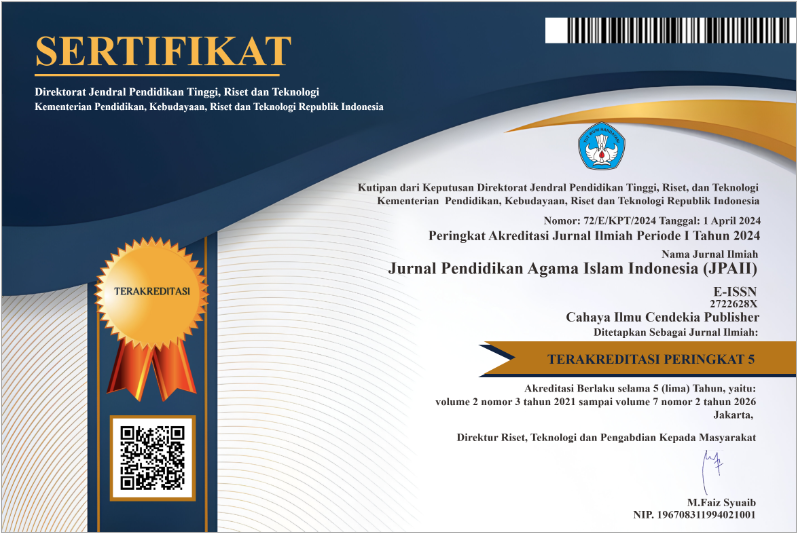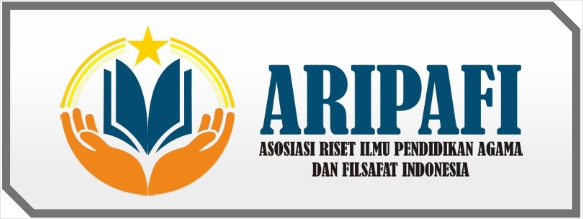The Social Competence of Al-Qur’an Hadith Teachers and the Learning Motivation of Seventh Grade Students at Madrasah Tsanawiyah
Abstract
Purpose of the study: The purpose of this study is to examine the implementation of the social competence of Qur’an and Hadith teachers in optimizing the learning motivation of seventh-grade students at Madrasah Tsanawiyah Radhiatul Adawiyah Mangga Tiga Makassar.
Methodology: This research employs a descriptive qualitative method with a phenomenological approach. Data were collected through observation, in-depth interviews, and documentation, with participants consisting of Qur’an and Hadith teachers and seventh-grade students.
Main Findings: The findings reveal that teachers’ social competence significantly enhances students’ learning motivation. Teachers demonstrated strong social skills through openness, fairness, effective communication, and the ability to foster harmonious relationships with students and the school environment. This competence was implemented through enjoyable teaching methods, the use of diverse learning media, and teachers’ active involvement in stimulating students’ enthusiasm for learning. Supporting factors included teacher collaboration and a familial approach, while inhibiting factors comprised students’ low discipline, limited school facilities, lack of specialized training for teachers, and students’ weak foundational abilities.
Novelty/Originality of this study: The originality of this research lies in its specific focus on Qur’an and Hadith teachers at Madrasah Tsanawiyah Radhiatul Adawiyah Mangga Tiga Makassar, offering new insights into the role of teachers’ social competence as an effective strategy to enhance students’ learning motivation in Islamic secondary education. This study emphasizes the importance of teachers’ social competence in creating a positive learning atmosphere and fostering active student participation.
References
D. Naibaho and B. P. B. Sitepu, “Kompetensi Kepribadian Guru Pendidikan Agama Kristen dalam Meningkatkan Karakter Siswa,” Jurnal Trust Pentakosta, vol. 1, no. 1, pp. 111–122, 2024.
R. I. Karadona, F. Fakhruddin, and N. Hudallah, “Elementary School Program Management Bosowa Nature School, Makassar,” Educational Management, vol. 11, no. 1, pp. 46–53, 2022.
R. Rahmawati, R. I. Karadona, and M. N. Alamsyah, “Barriers Faced by Adolescents in Pursuing Higher Education in Komba Village, Luwu Regency,” International Journal on Advanced Science, Education, and Religion, vol. 8, no. 2, pp. 329–335, 2025.
T. Tisnia, “Implementasi Kompetensi Sosial Guru Dalam Meningkatkan Motivasi Ekstrinsik Siswa Pada Mata Pelajaran PAI,” Jurnal Educatio FKIP UNMA, vol. 8, no. 1, pp. 65–69, 2022, doi: 10.31949/educatio.v8i1.1602.
R. Rahma, R. I. Karadona, and Y. Arsyad, “Implementasi Pendidikan Berbasis Ekopedagogik di Sekolah Alam Bosowa,” Journal of Lifelong Learning, vol. 7, no. 2, pp. 117–128, 2024.
N. Fadhliyah, “Kompetensi Sosial Pendidik Dalam Al-Quran,” Institut PTIQ Jakarta, pp. 1–357, 2022.
S. E. Pratiwi and M. Maftujianah, “Implementasi Pembelajaran Berdiferensiasi Dalam Meningkatkan Motivasi Belajar Peserta Didik Kelas 8 Di Smpn 2 Kalisat,” ScienceEdu, vol. 6, no. 1, p. 64, 2023, doi: 10.19184/se.v6i1.40022.
E. M. Almarghani and I. Mijatovic, “Factors affecting student engagement in HEIs-it is all about good teaching,” Teaching in higher education, vol. 22, no. 8, pp. 940–956, 2017.
J. Moghadasi and L. Keikavoosi-Arani, “Investigating the factors influencing students’ academic enthusiasm for a shift of paradigm among education managers shaping academic pedagogy,” BMC Med Educ, vol. 23, no. 1, p. 480, 2023.
J. D. Chaudhuri, “Stimulating intrinsic motivation in millennial students: A new generation, a new approach,” Anat Sci Educ, vol. 13, no. 2, pp. 250–271, 2020.
S. Waite, “Teaching and learning outside the classroom: Personal values, alternative pedagogies and standards,” in Outdoor learning research, Routledge, 2020, pp. 8–25.
Y. D. Puspitarini and M. Hanif, “Using learning media to increase learning motivation in elementary school.,” Anatolian Journal of Education, vol. 4, no. 2, pp. 53–60, 2019.
J. Naibaho and Hodriani, “Peran Guru Dalam Meningkatkan Motivasi Belajar Peserta Didik Di Sdn 01 Bilah Barat Rantau Prapat,” Ilma Jurnal Pendidikan Islam, vol. 2, no. 1, pp. 13–19, 2023, doi: 10.58569/ilma.v2i1.656.
subakti hanin; prisusanti dewi retno; fahmi aisyah; haryanti suci; pangestu ari nova; primasari anggun nessy; putri surya novita; adinata arfan A. hadi irwan; firmansyah Hamdan, Metodologi Penelitian Kualitatif. In Metodologi Penelitian Kualitatif, no. Maret. 2022.
C. Dignath and G. Büttner, “Teachers’ direct and indirect promotion of self-regulated learning in primary and secondary school mathematics classes–insights from video-based classroom observations and teacher interviews,” Metacogn Learn, vol. 13, no. 2, pp. 127–157, 2018.
K. A. H. Achjar, M. Rusliyadi, A. Zaenurrosyid, N. A. Rumata, I. Nirwana, and A. Abadi, Metode Penelitian Kualitatif: Panduan Praktis untuk Analisis Data Kualitatif dan Studi Kasus. PT. Sonpedia Publishing Indonesia, 2023.
L. J. Moleong, “Metodologi penelitian kualitatif (edisi revisi),” Remaja Rosdakarya, 2016.
K. Kamsin and M. E. Parmawati, “Pengaruh Kompetensi Sosial Terhadap Kinerja Guru,” in Prosiding Business Adaptability, Change Management and Technopreneur Conferences, 2023, pp. 400–412.
R. Agustin, N. Abbas, A. N. Khasanah, and F. R. Sari, “Peran Guru Dalam Membentuk Karakter Peserta Didik,” PANDU: Jurnal Pendidikan Anak dan Pendidikan Umum, vol. 2, no. 2, pp. 1–10, 2024.
A. F. Djollong and A. Akbar, “Peran guru pendidikan agama islam dalam penanaman nilai-nilai toleransi antar ummat beragama peserta didik untuk mewujudkan kerukunan,” Jurnal Al-Ibrah, vol. 8, no. 1, pp. 72–92, 2019.
S. N. F. A. Hadi and A. Darmiyanti, “Strategi Pengelolaan Kelas Humanis Dalam Proses Belajar Mengajar di Sekolah Menegah Atas,” Jurnal Ilmiah Penelitian Mahasiswa, vol. 3, no. 4, pp. 52–60, 2025.
A. Maulina and E. Zumrotun, “Pengaruh kompetensi sosial guru terhadap proses pembelajaran: studi kualitatif di Kelas 5 SDN Batukali,” Jurnal Riset Madrasah Ibtidaiyah (JURMIA), vol. 4, no. 2, pp. 208–217, 2024.
M. I. Sholeh, “Strategi Manajemen Organisasi Pendidikan Islam dalam Menghadapi Tantangan Global,” Edu Journal Innovation in learning and education, vol. 1, no. 1, pp. 1–27, 2023.
P. S. Mustafa, Buku Ajar Profesi Keguruan untuk Mahasiswa Pendidikan dan Keguruan. 2024.
E. Yulianti, “Implementasi Konsep Pembelajaran Abad 21 melalui penguatan sikap Berkolaborasi Pada Siswa Madrasan Tsanawiyah,” Didaktika: Jurnal Kependidikan, vol. 13, no. 3, pp. 3049–3056, 2024.
M. Kamal, Guru: Suatu Kajian Teoritis dan Praktis, vol. 12. 2019.
D. F. N. Hutabarat and D. Naibaho, “Peran Kode Etik Dalam Meningkatkan Kompetensi Sosial Guru: Peningkatan Kemampuan Berinteraksi Dan Kolaborasi Dengan Semua Pihak,” Jurnal Pendidikan Sosial dan Humaniora, vol. 4, no. 1, pp. 262–271, 2025.
A. R. Nurhuda, N. Fitria, and M. I. Ansori, “Kompetensi Sosial (Societal Comptance),” Jurnal Riset dan Inovasi Manajemen, vol. 1, no. 3, pp. 10–23, 2023.
I. Ismail et al., “Analysis of the Implementation and Achievement of Al-Qur’an Hadith Education at Madrasah Ibtidaiyah Al-Bhasirah Makassar,” Edusoshum: Journal of Islamic Education and Social Humanities, vol. 5, no. 1, pp. 131–140, 2025.
R. Ananda and F. Hayati, Variabel Belajar: Kompilasi Konsep. 2020.
D. Kurniawan, “Pengaruh lingkungan sekolah terhadap minat belajar siswa di sekolah dasar,” in Social, Humanities, and Educational Studies (SHES): Conference Series, 2022, pp. 373–378.
R. Hidayat, Buku Ilmu Pendidikan Rahmat Hidayat & Abdillah. 2019.
D. J. Priansa and E. Karwati, Manajemen Kelas (Manajemen Kelas). 2015.
A. Amiruddin and A. Datonsolang, “Strategi Pembelajaran Guru Al-Qur’an Hadis Dalam Meningkatkan Minat Belajar Siswa Ma Alkhairaat Bintauna,” Journal of Islamic Education Policy, vol. 9, no. 1, 2024.
Copyright (c) 2025 Nurjamilah Indah Lestari, Ismail Ismail, Fitriani Fitriani, Rosika Indri Karadona

This work is licensed under a Creative Commons Attribution 4.0 International License.
Authors who publish with this journal agree to the following terms:
- Authors retain copyright and acknowledge that the Jurnal Pendidikan Agama Islam Indonesia (JPAII) is the first publisher licensed under a Creative Commons Attribution 4.0 International License.
- Authors are able to enter into separate, additional contractual arrangements for the non-exclusive distribution of the journal's published version of the work (e.g., post it to an institutional repository or publish it in a book), with an acknowledgment of its initial publication in this journal.
- Authors are permitted and encouraged to post their work online (e.g., in institutional repositories or on their website) prior to and during the submission process, as it can lead to productive exchanges and earlier and greater citation of published work.







.png)
.png)





















